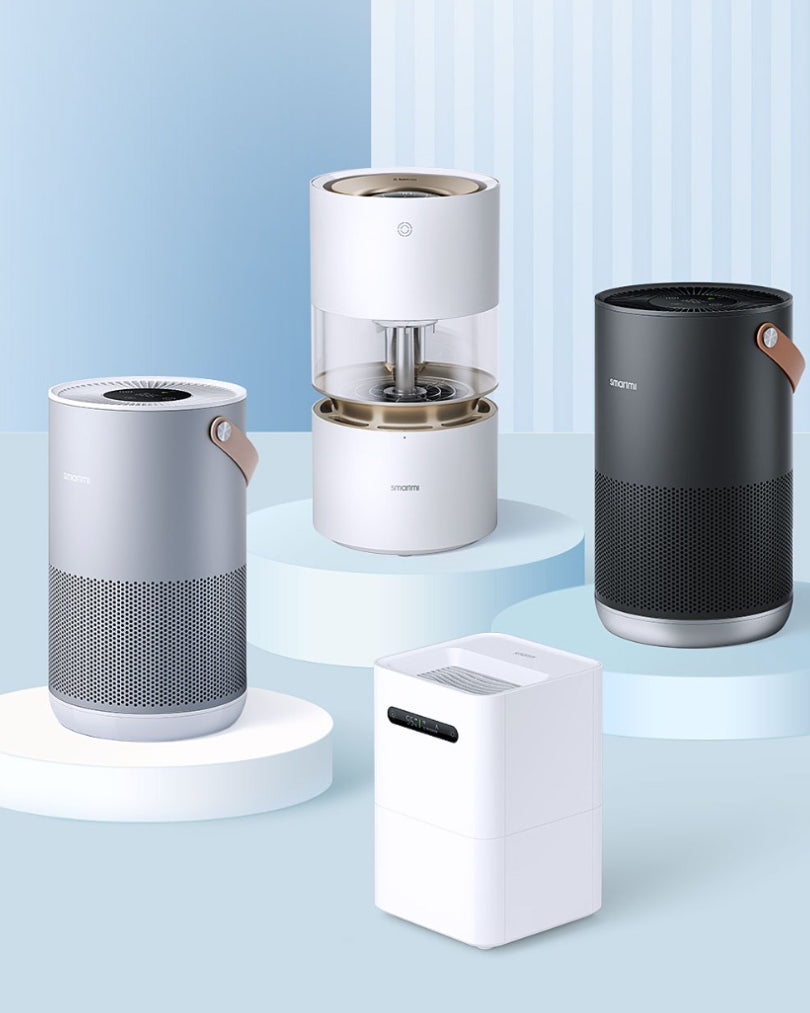Air Purifiers vs Humidifiers: What's the Difference and Which One Should You Choose?

Air purifiers and humidifiers have a significant impact on the air quality in your home, but they serve distinct purposes and offer unique benefits. Whether you're dealing with allergies, respiratory symptoms, dry air conditions, or you simply want to create a healthy home environment for your baby, it's essential to understand the differences between these devices and how to use them effectively.
We'll dive deeper into how air purifiers and humidifiers work, their safety considerations, and the situations where one is more suitable than the other.
Air Purifiers: How They Work and Benefits
Air purifiers work by removing pollutants and allergens from the air. They use filters to trap particles like dust, pet dander, and pollen, as well as volatile organic compounds (VOCs) and other harmful chemicals. Some air purifiers also use UV-C light or ionizers to neutralize or destroy bacteria, viruses, and other microbes.
There are several benefits to using an air purifier in your home. First and foremost, it can improve your indoor air quality, which is especially important if you or anyone in your household suffers from allergies or asthma. By removing airborne irritants and pollutants, an air purifier can reduce symptoms like coughing, sneezing, and congestion. Additionally, an air purifier can help eliminate unpleasant odors from pets, cooking, and other sources.
Humidifiers: How They Work and Benefits
Humidifiers, on the other hand, work by adding moisture to the air. They can help alleviate dry skin, chapped lips, and other uncomfortable symptoms that can be caused by low humidity levels. They can also reduce the amount of static electricity in your home, and protect wood furniture and floors from drying out and cracking.
There are several types of humidifiers available, including cool mist, warm mist, ultrasonic, and evaporative models. Cool mist humidifiers are known for their energy efficiency and ease of cleaning, making them a popular choice. Warm mist humidifiers are helpful in relieving cold and flu symptoms and can be more soothing to the throat. Ultrasonic humidifiers use high-frequency vibrations to create a fine mist, which can be easier to breathe than larger droplets. On the other hand, evaporative humidifiers work by blowing air through a wet filter or wick, which causes the water to evaporate, adding moisture to the air. Knowing the differences between these types of humidifiers can help you select the best one for your specific needs and circumstances.
Air Purifiers vs. Humidifiers: Which One Should You Choose?
So, which one should you choose: an air purifier or a humidifier? The answer depends on your specific needs and concerns. If you're primarily concerned about removing allergens and pollutants from the air, an air purifier is likely the better choice. However, if you suffer from dry skin or other symptoms caused by low humidity levels, a humidifier may be more beneficial.
It's important to note that air purifiers and humidifiers are not mutually exclusive. In fact, buying both devices can be beneficial for your home's air quality. By using an air purifier to remove pollutants from the air, and a humidifier to add moisture, you can create a more comfortable and healthy indoor environment.
Benefits of Using Both Air Purifiers and Humidifiers
Using both air purifiers and humidifiers can provide several benefits for your home's air quality. For example:
- Humidifiers can help prevent dryness and irritation caused by air purifiers, especially if you're using a model that generates ozone or other byproducts.
- Air purifiers can help remove airborne bacteria and viruses, which can be especially beneficial during cold and flu season.
-By controlling both humidity levels and air quality, you can create a more comfortable and healthy indoor environment for you and your family.
Conclusion:
Air purifiers and humidifiers have unique benefits that can work together to create a more comfortable and healthy indoor environment. While air purifiers are effective in removing pollutants and allergens from the air, humidifiers add much-needed moisture to alleviate symptoms caused by dry air. Investing in both devices can provide comprehensive air quality control, including the removal of airborne bacteria and viruses, prevention of dryness and irritation, and the creation of a more comfortable living space. Ultimately, the decision to purchase an air purifier, humidifier, or both, depends on your individual needs and concerns.


